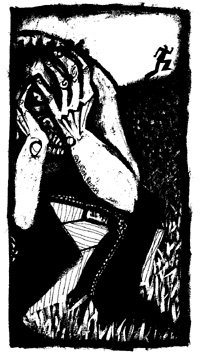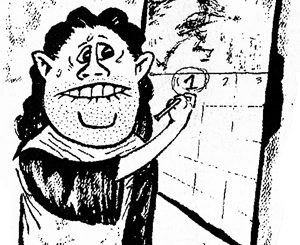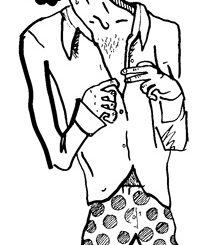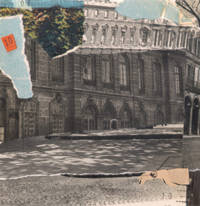 Down on the Farm
Down on the Farm
Part IV: The Conclusion
by Todd Brendan Fahey
illustration by Mark Reusch
At a patch of earth near the house, Jack Laroue plucked a handful of flowers by the root. “We’ll drink this,” he nodded. “Chamomile: it’s kept me sane.” Then he sniffed the reeking air and smiled. “Why don’t we go back inside?”
The flowers rinsed painstakingly, almost obsessively, under a running stream at the sink, he turned to me, a picture of relaxation on his ruddy, elongated face. “You wanted to know about the headdresses,” he offered. “I’ll give you that tour now.” But before he did, he opened a closet door and turned on the stereo, which I saw to be nothing more than two fifteen-hundred watt monophonic Carver amps and the same brand CD player, of rare vacuum-tube construction, running through two pairs of tall, elegant Vandersteens, one speaker in each corner of the room – a deceptively simple combo that told me more about this Mephisto than I had been able to infer all evening: Jean-Louis Lebris de Laroue was a natural-born freak for power, a champion of purity and grace, a man for whom Art is the only currency befitting reverence.
A familiar, snaky riffle came pulsing out of the Vandersteens, and I recognized it as the Spin Doctors’ debut offering, A Pocketful of Kryptonite, even at molten volume. Laroue started in on an eccentric dance, moving his feet and snapping his fingers at critical junctures in the music, which he apparently had long ago memorized, note-for-note. “The prophets of a new millennium,” he wailed over the din. “They had to have known! God, finally!” Then, recovering abruptly from the strange ecstasy, he went back to the closet and adjusted the volume to accommodate the average tympanic membrane.
“These headdresses,” he said, suddenly reversing gears, “are from the Battle of Big Horn. Fifty four of them – every brave Custer and his men took. I needed them for polarity,” he said, smiling inwardly. “It’s what makes The Spin possible. I tell you, I felt like Tesla when it first came to me,” he laughed arrogantly. “You’ll understand, too, by the time you leave. You have to: the more people who know, the safer I am.”
With the curl of a finger, Laroue motioned me over to what I had assumed was the coat closet, but which was really a small, walk-in humidor. “I want to show you where it all starts. Bring your eyes to the picnic.”
I had probably seen more sheer tonnage in one place, but never in hell had I seen so many different strains of marijuana – it was like a field trip through the Tinder Box, every jar housing a unique, mind-bending synthesis. On the bottom quadrant of the closet alone, I counted a Purple Skunk #1; something labeled Cosmic Hippo; a fiery-orange, seedless number called Screaming-Engines-at-Dawn; Afro-Kind, a resinated indica trip guaranteed, he attested, to separate the limbs from the rest of one’s body for a good four hours (“You never drive on that one”); Holy Moley; Ju-Ju Jones; and a harsh-smelling Mexican in a jar branded with a big black Death’s head, which he explained was a continuing experiment in transforming paraquat, a lethal herbicide, into something uniquely psychedelic.
“I’ve got a team working on it, but it’ll probably turn out to be too expensive. Besides,” he chuckled, “everyone in the Sinaloa state smokes it anyway.” He wrapped his tendrils around a jar with no label and brought it back to the coffee table. “Sit down,” he said, and I did. “This is where it all comes home: the most important goddamn botanical breakthrough in the last half of this century.”
Under a wall of Indian headdresses, he sank easily into the couch and unscrewed the top from the jar. “In 1986, I was commissioned to develop a strain of high-altitude cannabis indica to replace the Andean coca crop. I was living in Washington, working as the Poet-in-Residence to the Library of Congress,” he said, “when I got the call from someone in the Reagan White House. The calls always came in the middle of the night; the guy sounded like he was speaking through cheesecloth, so it’s hard to say exactly who it was. I’ve narrowed him down to three people on Bush’s team, but really it doesn’t matter,” he shrugged. “What I was told was this: the White House would soon be reversing its strategy in the War on Drugs by replacing the South American cocaine crop with good old-fashioned hemp – the kind George Washington used to smoke,” he beamed, as he began fashioning into a joint the shakey refuse from the bottom of the unlabeled jar. “In ’91, the Bush team was about to cripple both the Medellin Cartel and the Democratic Party forever by legalizing marijuana as a valuable medical tool and an elemental way by which to rejuvenate the Earth’s biomass. Can you imagine the voting bloc that dumb sonofabitch would’ve picked up!?”
“So what happened?” I fairly shouted, hooked on a story I knew was so insane that it had to be the truth.
“Bush started listening to Quayle’s people,” he scowled, shaking his head. “The Roundheads warned him to back off on the Dope Thing; that he didn’t need it: The election was already In The Bag. All that was left for Bush was for our CIA to oust the heads of Peru and Colombia. They got it right in Peru when we installed that fascist Jap, Fujimori, but the Colombian cartels were just too powerful. We’re still waiting. For the last six years, I’ve been customizing this marijuana varietal to replicate the amphetamine-like effects of the coca plant so these hill-niggers can keep working their long hours at unholy altitudes. Here, smoke a little,” he said, offering me a tightly twisted pinner.
The dog-fight had completely neutralized the THC from my system, and by this time, I was feeling brand new. I drew several times on the stick before passing it back. “Yeah, but Bush is history. We’ve got Wild Bill now,” I said, feeling my heart skip a beat, then race almost immediately.
Laroue finished the joint, and I saw a manic countenance return to his face. “They came to me because I’m a Bonesman: tapped second, Class of ’68. I’m not supposed to talk about it… but what the fuck, right?” he said, mirthlessly. “It was all over town after that Doonesbury strip, anyway. I’ve even tried to appeal to our Mr. Clinton as a fellow Rhodes scholar, but the man appears to have no loyalty. His PR weasel – what is it, Stokka… Spotcha… Stopyohoffalas, you know who I’m talking about: that mean little shit with the grown-out butch – little fucker won’t let me in the servants’ door. So I started thinking about Polarity,” he grinned. “The Press took Clinton’s Oxford dope thing and scared him shitty. He’s never been grounded properly, and now he’s running away.”
Laroue walked over to the stereo and pressed repeat, the Spin Doctors churning again into the room. “God, it’s so clear!” he tittered. “The whiplash is going to be violent.” Then the mad sage chronicled in stupefying detail how he would shore up his bets on four or five major players on the Right Wing of the Republican Party – Pats Buchanan and Robertson, Rush Limbaugh, William Bennett, and maybe Phil Gramm – by launching a very public drive to restore the good name of General George A. Custer. “That will be my invitation to dinner,” he glimmered. “Then, when the Right realizes to stay alive in the second millennium it must have the Hemp vote, I’ll be brought in as Drug Czar. Can you hear it?,” he chortled, “Black Jack Laroue: America’s most successful rehabilitation project.”
With the sun breaking low on the horizon, he walked out through his patio and sat on the steps and stared morosely out on his acreage, and I took this as an opportunity to flee. The last thing I heard was the sound of weeping: “They own seventy percent of my farm now,” he moaned, over and over. “I’m a squatter on my own land.”
***
I sprang for a bottle of Cardhu when I reached the town of Jackson, three hours later, by foot, my ankles raw and bleeding from a constant high-stepping through the tundra. And despite my wild-eyed raving, Massey assured me that I hadn’t gone mad at all – in fact, it was all childishly simple.
“Certainly,” he snuffed, knocking back a tumbler of the Highland malt. “I like to think of it as a matter of ballast. Every Trilateral Commission has its counterweight, its house conservative, its William Buckley. This Mr. Laroue is the Jacobin of America’s Religious Right,” he said matter-of-factly. “But I wouldn’t place much on him; it sounds like syphilis to me. Only the brain-rotted wager away land on canines.”
***
Buster was upset. His chain had become hopelessly twisted around an empty foodbowl. A tick on his back was getting fatter and fatter with his own blood. The dog bawled and stood on its hind legs and fell back against the fence, rubbing the hard-shelled parasite up and down on the steel links until it drew in its spike and dropped into the dirt.
He whined and cocked his head and watched the tick wriggle furiously, legs grappling at the air as it tried to right itself. He lowered his head and sniffed, then backed up and began barking, sensing an unpalatable evil. He lifted his leg and covered it with a warm spray of urine, then kicked a mound of fresh dirt over the malignant creature, which suffocated it.
The surface of Buster’s water dish was covered with the same ants that had devoured the last of his dry food in the middle of the night, marching over his paws and sending him into a howling frenzy. His last real meal had been two days earlier – a small treat that had wandered too far from the woodpile. It was a young, furry calico and it took about thirty seconds to digest. Buster had lapped up all the blood and fur from the surrounding grass to keep the ants from returning, but they came anyway.
The sound of car doors caused him to cock his head and whine expectantly. His cropped tail twitched in recognition, as a stout, aging man stepped down the stairs and into the yard. Buster watched the man remove something down at waistband level and followed it as it caught the mid-morning sun. A sharp click forced another tilt of Buster’s neck. It was the last motion he would ever make.
***
Marnie set the brake and trotted around the Chamber of Commerce minivan to open the passenger door for me. The look in her kelly eyes was one that I hadn’t seen since the last day of my last coed summer camp as a pre-teen. I felt like holding her, but then I remembered she had been Laroue’s plaything, and my libido went flat. “Maybe we’ll invite you back…” she said, biting on her lower lip again, “since you slept through most of why we brought you here in the first place.”
I took her hand with both of mine, kissed her on the cheek, and walked off, having said nothing. The tiny Jackson Hole Municipal Airport was nearly empty on this day after Memorial Day, and I felt even more hollow. I understood supremely why the ostrich, the wisest goddamned animal alive, spends its happiest days head planted squarely in the topsoil; and until a sheriff approached me in that barren terminal, I felt as if I might just do the same: go back to law school… quit thinking so much.
The dumb bliss was summarily shattered by the man in the uniform, who tapped my shoulder as I sat near the ticket-counter in one of the little black bucket seats, reading from a copy of Esquire. I recognized him as the man who had pitted the slain dog, but he showed no outward signs of remembering me.
“I’m sorry I’ve even got to bother you with this, son,” he said, shrugging appropriately. “I know you’ve got a flight to catch, and I’m gonna make good and sure you’re on it. But as you were the last person to see Jack Laroue alive, I think you can understand why I need a quick statement.” He withdrew a pen from his shirt pocket with his sausage-like fingers. “Now, boy, what time did you leave Laroue’s residence this past Saturday?”
My body was zinging from scalp to sole. “I guess it was around five-thirty. The sun had just come up,” I said. “What’s going on?”
“And was he alive when you left that morning?” the Sheriff continued.
I nodded. “He was sitting on the porch steps. He was distraught about…” I stopped myself, and the Sheriff seemed to genuinely appreciate the fact that I had.
“Son,” he smiled, “the best thing you could do in this whole world right now is to board that plane and forget you ever met Jack Laroue. He was a disordered man, and God did abandon him long ago,” the old peace officer confirmed, sliding the pen back into his shirt pocket. “Oh, by the way – that cabbie who brought you up here from Salt Lake City. He was released this morning. Just thought you might want to know. The paperwork came by special delivery. Clinton’s point guard signed off on the deal – George… oh, what the hell’s his… sounds like… Snufalufagus; I can never pronounce the damned thing. Said the sand-nigger was ‘just too valuable’ to be incarcerated. Damndest thing I ever heard. It’s a miracle of modern medicine, I tell you. They can cure anything in Washington!”
It was all in The Spin I decided, staggering aboard the Delta flight: a little retooling of the ol’ résumé, a bad haircut, and Shazam! I was gripped with the fever of a New Sensibility; the rules were mine to be made. Collapsing in my cramped seat, I was suddenly overcome with love for our new President and for his Rodham and the daughter they chose to bring into this world together, even though I knew she was probably an accident. And I resolved to nurture my furtive little cichlids when I returned home, to allow them their coveted privacy, to respect their decision to remain childless. I smiled and closed my eyes and felt a little giddy as the plane lifted up into the sky. In a dreamy sleep, I imagined myself at a Washington cocktail party where everyone seemed excited and talked of the 1980s as if recovering from some tragic illness, and where not a single fur could be spotted among the throng, and where the jazz quartet had just come from their daytime gig in the subway; and when the bell tolled midnight, we all gathered ’round and linked arms and shouted one long huzzah!, each ushering in our own very private dreams with a jigger of Clorox.
Please visit Todd Brendan Fahey’s Far Gone Books/Wisdom’s Maw Website: http:// www.fargonebooks.com



